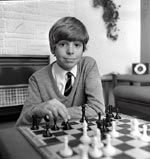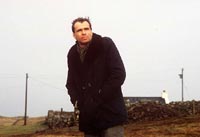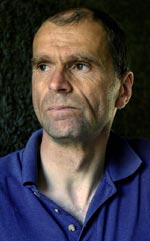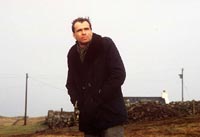The task of the novelist once was the presentation of the entirety of a life. Think Victor Hugo, think Great Expectations: we follow a child into adulthood, perhaps through to death, looking on from a privileged vantage point outside their circumstances. Tracing the vast arc of a human life, we glimpse what a human soul might look like viewed as a totality, outside of time.
It’s a God’s-eye view, a perspective our own lives don’t afford us.
What an extraordinary privilege it is, then, to experience any of the films in director Michael Apted’s “Up” series, the most recent of which, 49 Up, opens in select theatres this week before releasing wider in the coming months. For the first time in history, we see actual human lives charted over the span of decades, with documentary footage of the same individuals first encountered in a London playground at seven years of age, then revisited every seven years.

In 1964, the BBC’s “World In Action” program produced an episode entitled “Seven Up!” which brought children from radically diverse economic backgrounds together for a day at the zoo, observing them at play and pulling each of them aside for a chat about life’s Big Questions: “What do you want to be when you grow up?” “Do you believe in God?” “Do you have a girlfriend?”
It was marvelous, thought-provoking television. With the Jesuit dictum “Give me a child until he is seven, and I will give you the man” as a starting point, the original program suggested that a great deal of the future had already been determined for these children, based on their economic class, family backgrounds and educational prospects. But what began as sociology with an axe to grind transformed to something much more personal and mysterious, even spiritual, as the exercise continued with follow-up conversations at 14, 21, 28 and beyond.
It wasn’t until 1985 that the series made its leap to the big screen with 28 Up, the film which remains the masterpiece of the series—partly because it is the last of the installments largely free of the effects of relative celebrity (due to the growing popularity of the series), and partly due to a focus and concision that becomes more diffused as later installments must cover more ground, and spend disproportionate amounts of time catching up the most recent seven years, touching more lightly on the preceding six episodes.

Tony, a rough-and-tumble East End kid, enthuses, “I want to be a jockey when I grow up!” Immediately we cut to a proud 14-year-old grooming horses at a racing stable, then cut to footage of a horse race that fades to a black-and-white glossy photo held out for us to inspect as we hear a deeper, 21-year old voice: “This is a photo finish, when I rode at Newbury. I’m the one with the white cap … I had a photo finish.” Then the voice of the interviewer: “Do you regret not making it?” A slight pause, then: “I would have given my right arm to become a jockey. I wasn’t good enough.” Jump cut to the 14-year-old Tony, standing by the racetrack: “What will you do if you don’t make it as a jockey?” “Learn taxi.” Another jump cut, to a line of black London cabs: “At 21, he was on the knowledge [the intensive training course for London cabbies], and by 28, he owned his own cab,” followed by the image of Tony grinning behind the wheel and spinning tales of the passengers he’s driven about. In sixty-four seconds we have scanned two decades of dreams, disappointment, compromise, accomplishment and—above all—courage. It is extraordinary filmmaking, breathtaking in its economy and craft, with a cumulative emotional effect that is both devastating and exhilarating.
We meet a dozen children, and follow them through plans fulfilled or failed or transformed, hopes lost and sometimes recovered. Some struggle, some succumb, some triumph. Some breeze down roads paved by wealth or ability, others travel very dark terrain indeed. Bruce studies math at Oxford, but departs from typical upper class expectations to teach at an underprivileged East London school—fulfilling, in a way, his childhood desire “to teach people to be more or less good.” Nick’s dream of working with rocket ships draws him to physics, which leads to a sparkling academic career in America—and romance, all the more delightful given his charming childhood reticence: “Do you have a girlfriend?” “I don’t answer those kinds of questions.”

Jackie, Lynn and Sue maintain a friendship across the years, but one becomes increasingly antagonistic toward the project and the director himself as the years progress—this becomes a significant theme in subsequent episodes, as the project takes an increasing toll on certain participants who might not otherwise consider their lives quite so scrupulously, and certainly not so publicly. Socrates remarked that the unexamined life is not worth living: some of the film’s subjects wonder aloud whether too much examination might also be a problem.
While the entire series of films is eminently worth watching—with all but the latest installment now available in a splendid boxed set—overall the sequels lack the punch of 28 Up. Perhaps that’s purely a subjective response; 28 Up was my first exposure to the series. Or perhaps it has to do with the particular vividness and rapidity of change during our first three decades of life. Or perhaps it relates to a subtle shift in the lives of the participants, whose relative anonymity disappeared in the wake of that first big screen release (the previous docs were lower-profile television fare): the effect of a certain sort of celebrity becomes a theme, and while it’s handled with intelligence, it doesn’t resonate so deeply for me as the stuff of lives more ordinary.
There is one respect, though, in which 49 Up is utterly essential viewing, particularly for those of us scanning these crowds for some sign of God’s face (to paraphrase Bruce Cockburn). The “Up” films rarely delve into matters that are specifically religious, yet they are suffused with something deeply spiritual. As questions about love, work, family and meaning reverberate through these lives, we are privy to the outworking or overcoming of destinies, the growth of souls. The “Up” documentary series provides us an almost miraculous, quintessentially cinematic opportunity, in the words of Dickens, to think of other people “as if they really were fellow-passengers to the grave, and not another race of creatures bound on other journeys.”

East End girls Jackie, Lynn & Sue reminisce about the changes over the years
Yet in this most recent installment in the cycle, God’s grace is all the more explicitly and abundantly evident in one particular life—and, remarkably, director Apted gives this divine “plot twist” pride of place in his documentary. (And here, it’s interesting to note that Apted’s next directorial release will be Amazing Grace, the story of hymn writer John Newton and the great Christian abolitionist William Wilberforce, coming in February 2006.) A rather reluctant participant suggests that the series has no more significance than a reality TV show, with the added appeal of watching participants “grow old, lose their hair, and get fat—fascinating, I’m sure, but does it have any value?” Then, without comment, Apted moves us into the final sequence of 49 Up, and God’s amazing grace is revealed in the most broken, and heart-breaking, of the lives being lived out before us. It is in this most spiritually remarkable passage that the film recaptures the aesthetic richness and emotional power of 28 Up, juxtaposing a simple, evocative anecdote from the soft-spoken 49-year-old survivor with exultant footage of his optimistic 7-year-old self—a tacit, affirmative response to the skeptic’s question, “Does it have any value?”
Apted’s ongoing documentary project is one of the most singular and transcendent expressions to emerge during the first century of this newest art form, and it is our privilege to be able to watch it as it unfolds—every seven years, to be given so intimate and respectful a window on the journeys of these dozen souls. And to be led in turn, inevitably, to examine our own lives, and to look at the lives of those around us with a longer view, a perspective that’s something close to Divine.
Talk About It
Discussion starters- The Jesuits say, “Give me a child until he is seven, and I will give you the man.” Do you agree with this statement? Do the ongoing experiences of the people profiled in this film series bear out this sort of determinism, or contradict it
- One of the subjects seems to express some regret or embarrassment at ending up in a relatively comfortable position in his mid-life, having worked in more sacrificial and “socially conscious” projects in earlier years. How does this compare to decisions you have made in your own life? What do you think is God’s perspective on this
- In 2 Corinthians 12, Paul talks about the mysterious “thorn in his flesh,” an unspecified weakness or ailment which both humbled him and became an occasion for God to demonstrate his love and power, even in Paul’s weakness. At least one person in this film seems to provide a striking example of this. How do you see the role of suffering and other difficulties in your own life, or the lives of friends?
The Family Corner
For parents to considerThe film contains no offensive material, apart from some quite mild language. Children would be unlikely to find the film of any interest, but it is worth noting that young viewers might be troubled by a number of marriages which run into difficulty, some ending in separation or divorce: there is passing reference to an extramarital affair.
Photos © Copyright Granada International
Copyright © 2006 Christianity Today. Click for reprint information.
What Other Critics Are Saying
compiled by Jeffrey Overstreetfrom Film Forum, 10/12/06If you haven’t yet discovered Michael Apted’s “Up” series, you’ve missed out on one of the most extraordinary moviegoing experiences we’ve ever been offered.
In 1964, Apted began his series of landmark documentaries by interviewing a group of several seven-year-olds from different areas in London, and promising us that this glimpse would give us strong indications of what these individuals would become later in life. In a sense, he set out to envision the future of Britain.
And so, he began making follow-up films every seven years, checking in on what was happening in each individual’s life. What began as a project for television moved to the big screen. Now, all of them are now available on DVD in a convenient boxed set: 7 Up, Seven Plus Seven, 21 Up, 28 Up, 35 Up, and 42 Up.
Thus, for those who have followed this “reality big-screen” drama, which has been full of delightful surprises and devastating turns, the arrival of 49 Up is a reason to rejoice.
Almost unanimous in their rapturous praise, mainstream critics are celebrating this as another brilliant chapter in a monumental achievement.
from Film Forum, 11/16/06J. Robert Parks (Framing Device) says, “The amazing thing about 49 Up is that you don’t need to have seen the other parts to understand these people. [Director Michael] Apted and his able editor Kim Horton weave the new footage seamlessly with clips from earlier films, highlighting how people have grown older and how their earlier choices have laid the groundwork for who they are now. … Its 135 minutes fly by … and you’re left wishing you could stay even longer with these fascinating, vulnerable folk.”











